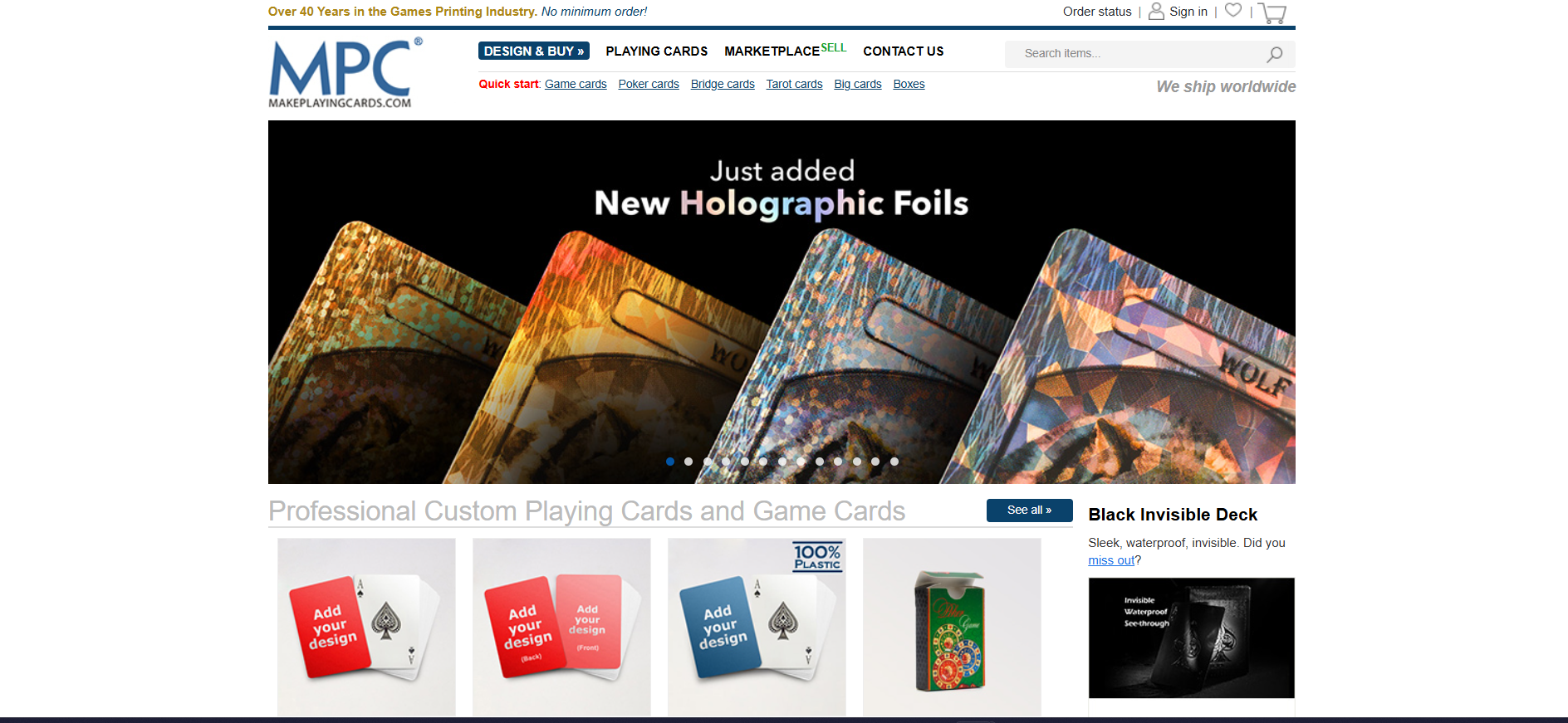MakePlayingCards
MakePlayingCards (MPC) specializes in custom playing cards, tarot/game cards, and packaging. Upload designs, choose finishes (linen, smooth, premium cores), add tuck boxes or rigid boxes, and ship worldwide. Clear MakePlayingCards pricing, dependable fulfillment times, and pro options for creators and game studios.
MakePlayingCards overview
MakePlayingCards manufactures every deck to order and focuses on cards-first POD—playing cards, tarot and oracle decks, custom game cards, and add-ons like tuck boxes, rigid boxes, foil, and custom seals. You can pick stock weights, cores, coatings and textures (linen or smooth), then apply artwork to card fronts/backs and the packaging. Beyond standard poker and bridge sizes, MPC supports tarot and many specialty sizes plus accessories like playmats and rule booklets. If your brand sells card decks or you’re building a prototype-to-launch pipeline for a game, MPC is purpose-built for that niche.
Pricing, quality, and fulfillment
Conversations about MakePlayingCards pricing usually revolve around stock/finish choices and deck quantity. Always compare landed cost—base price plus shipping, taxes/duties and any finish upgrades (foil, spot UV, custom boxes)—against your selling price. Quality hinges on paper core (black/blue premium cores resist show-through), surface texture (linen vs. smooth), cut tolerance and color consistency; order production samples of your chosen stock/finish before a big run. Typical fulfillment times vary by complexity: simple decks can move in ~3–7 business days, while premium finishes and specialty packaging add time; shipping windows then depend on destination and service level.
Integrations and branding
MPC is not a marketplace-style POD integrator; most sellers order directly (to themselves or to customers), or automate via CSV/API for volume workflows. That said, it’s strong on brand presentation: custom tuck or rigid boxes, printed inserts, seals, and shrink-wrap help the deck arrive retail-ready. If you list on Shopify/Etsy/Woo, you’ll typically manage listings/margins in your store and trigger MPC orders after purchase (manually or via automation). Use clean, true-to-scale mockups and call out finish/texture—those details materially affect conversion for card buyers.
When MakePlayingCards makes sense
Choose MPC when your catalog emphasizes playing/tarot/game cards and you want professional stocks, finishes, and packaging without committing to offset MOQs. It’s a strong fit for artists selling tarot/oracle decks, indie game designers, and brands adding premium card products alongside apparel. If you require fully automated store integrations across many categories or ultra-low base costs on everyday merch, mix suppliers—use MPC for decks and a standard POD (Printful/Printify/Gelato) for tees, mugs, and posters. Either way, MPC’s combination of stock options, finish control, and reliable deck production makes it a practical engine for card-centric launches.
Alternatives: For an all-in-one game-making platform with components and small runs, see The Game Crafter. If you want a sister brand focused on broader board-game parts, try BoardGamesMaker. For everyday merch and automated store integrations alongside your deck, use Printful or Printify. Explore more providers on our POD Suppliers hub.
